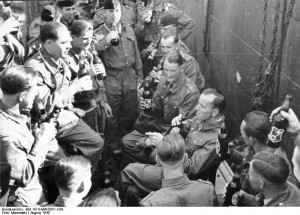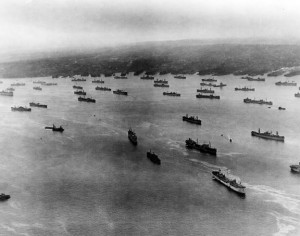For the character of Jürgen Mohr in my story, I drew inspiration from the personal history of the most successful German submarine commander of World War II – Otto Kretschmer. As commander of the U-23, then U-99 Kretschmer sank 47 allied merchant and war ships – more than 270,000 tons of shipping – a mighty blow for Germany in the Battle of the Atlantic.
As a teenager, Kretschmer spent eight months in Britain and like Jürgen Mohr in ‘The Interrogator’, he learned to speak English fluently. He joined the navy in 1930, transferred to Germany’s small submarine force in 1936, and by the beginning of the war he was the commander of his own U-boat. Those who served with him remembered him as cool, distant, taciturn – he was known in the U-boat service as ‘Silent Otto’.
In October 1940 the U-99 intercepted a convoy in the North Atlantic just like the one Douglas Lindsay’s ship, HMS Culloden, is protecting in my story. Here is an extract from his war diary describing the view from the bridge on the conning tower as he races to join the attack on convoy SC 7:
18th October
17.45 U-101 is 2 to 3 miles further north: gives the Morse signal by light: ‘enemy sighted to port’.17.49 A warship comes into view at 030, steering east. Shortly after this smoke plumes appear to the left of her. Finally the convoy.
22.55 Fire a bow torpedo at a large freighter of some 6000 tons at a range of 750 metres. Hit abreast foremast. Immediately after the torpedo’s explosion, there is another explosion with a high column of flame from the bow to the bridge of the ship. The smoke rises some 200 metres. Bow apparently shattered. Ship continues to burn with a green flame [the Greek freighter, Niritos, carrying Sulphur].
00.15 Torpedoes from the other boats are constantly heard exploding. The [British] destroyers do not know how to help and occupy themselves by constantly firing starshells [flares], which are of little effect in the bright moonlight. I now start to attack the convoy’s stern.
01.38 Fire bow torpedoes at large heavily laden freighter of about 6000 tons [the Fiscus], range 945 metres. Hit abreast foremast. The explosion sinks the ship.
01.55 Fire bow torpedo at the next large vessel of some 7000 tons [Thalia]. Range 975 metres. Hit abreast foremast. Ship sinks within 40 seconds.

Kretschmer celebrates the award of the Knight’s Cross [the decoration at his throat] with his crew in the summer of 1940.
But Kretschmer’s luck ran out in March 1941 when the U-99 was caught on the surface by a Royal Navy destroyer and attacked with depth charges as she attempted to dive for safety. “We went down to this unbelievable depth, and I said to myself, ‘Well, this is it. One second more and there’s one big crack and we are pressed together by the pressure like an empty tin can’’, one of the U-99’s crew recalled later; “And then the commander said, ‘Come on, give it air. Give it air’. Kretschmer was completely cold-blooded, quiet, in control.’”
The U-99 slipped to almost 700 feet before sufficient air could be blown into the tanks to bring the boat to the surface. Kretschmer and his crew scuttled the submarine and were rescued from the sea, and – like Mohr in The Interrogator – taken to the interrogation centre at Trent Park in Middlesex. The officers were then transferred to Grizedale POW camp in the Lake District.
During Kretschmer’s time as the senior German prisoner there, a secret Council of Honour was held to question and judge the first officer of the ill fated U-570. In August 1941 the inexperienced and crew of this U-boat had panicked and surrendered to a British aircraft at sea. The first officer was found guilty of cowardice by the Court of Honour for his part in the affair and ostracised by the other prisoners. In an effort to regain his good name, he attempted to escape and was shot while on the run in the Lake District. There were two investigations into the Court of Honour but no war crimes charges were brought against Otto Kretschmer or any of the other prisoners. After the war he served as an Admiral in the West German navy.
Here is some film shot aboard the U-99 in the summer of 1940 – the U-boat ‘happy time’ – by a propaganda reporter like Helmut Lange in my story. Otto Kretschmer is seen attacking an allied ship at periscope depth. The film gives some impression of the cramped conditions aboard the submarine, and ends with the German U-boat ‘Sailing Against England’ song.

